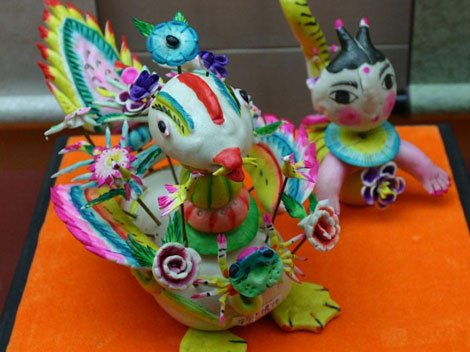
A 4,000-year-old Chinese folk art rarely practiced today, dough figurine is also known as mianhua or miansu in Chinese.
The man who may have created the craft, Zhuge Liang, was military strategist of the state of Shu in the Three Kingdoms era (220-280). According to a local legend, he once tried to organize a crossing of the Han River but the waves were so high that passage was impossible. Advisors recommended a sacrifice of 49 human heads to calm the waters. Not wanting to see any loss of life, Zhuge Liang ordered 49 dough heads made, stuffed with beef and horsemeat. The ploy successfully fooled the spirits responsible for the choppy waters and ever since then, Zhuge has been known as the father of dough-figurine making.
Dough figurines have been present in Chinese culinary culture for a long time, appearing in Tang dynasty (618-907) tombs as sacrificial offerings, In addition to serving food for human consumption, traditional Chinese banquets included a table of offerings to the gods, composed of flowers and figurines. After the feast, the decorations became toys for children or were thrown away.
In a 2008 article, the Taiwan Journal profiles 74-year-old Wu Chen Su, a contemporary dough figurine artist along with her son and husband. Their modest home is decorated with more than 150 collections of the figurines.
The Wus got their first taste of dough-figurine making while operating the family bakery business. Whenever there were festivals, people would order cakes baked in various shapes, including pigs, fish or ducks, and leave them on the altars as sacrificial offerings to ancestors or deities. Wu Chun-te said that one year, his mother met a master dough-figurine maker who visited Changhua and made an offering with a dough pig he had sculpted. Fascinated by the realistic appearance of the porker, she convinced the master to teach her the secrets of the craft during his stay in their home. The man not only taught her how to take a ball of dough, squeeze it into shapes and then assemble them to create a figure, but he shared the recipe for making dough in the traditional manner using uncooked glutinous rice, flour, water and a pinch of salt as an antiseptic."
Wu Chun-te leads classes in dough figurines for students aged from 5 to 96 in high schools, community centers and reform schools. He's received invitations to demonstrate his skills in Japan, Poland, Paraguay, Russia and the United States flooding in. "We have received far more interest in dough-figurine making from abroad than I ever expected," he said so.





